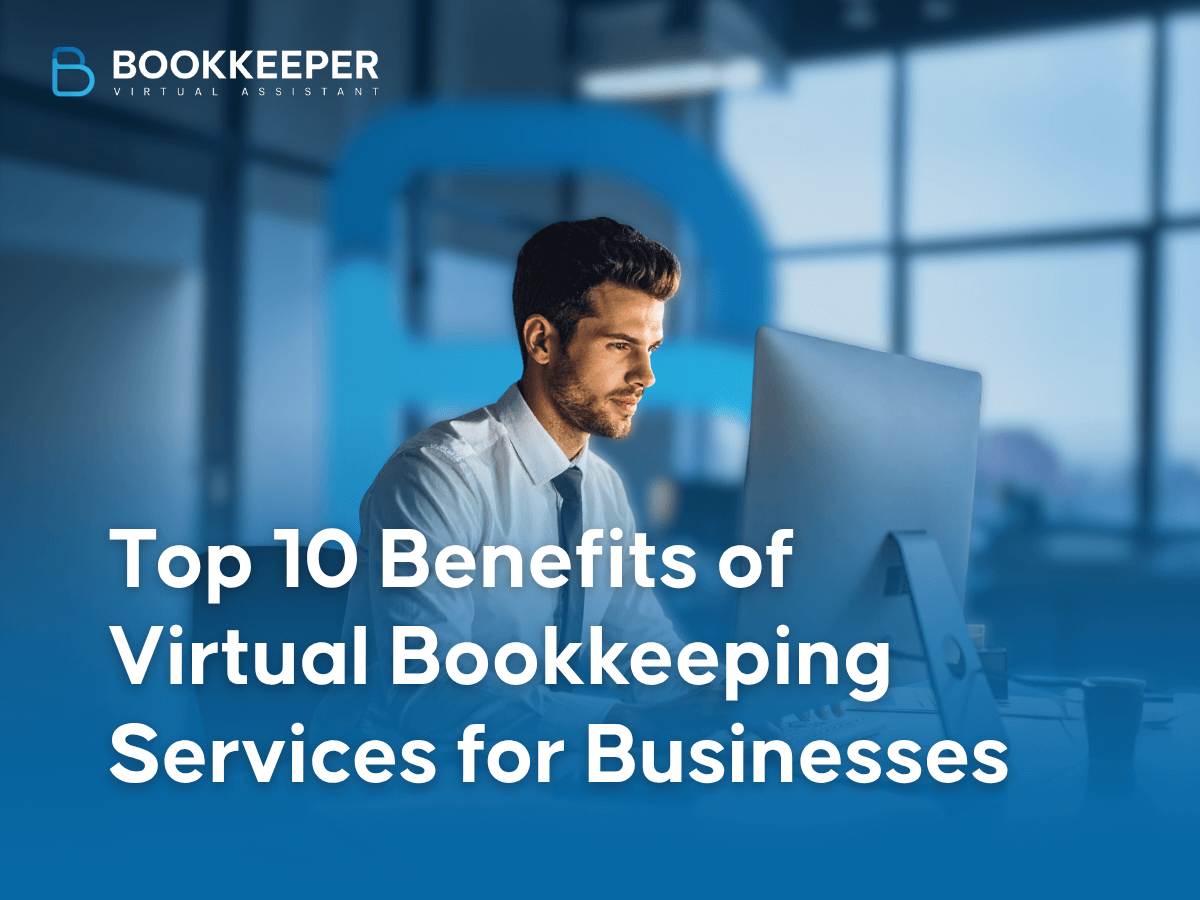Bookkeeping is essential for any business, but it can quickly become overwhelming, especially for small and medium-sized companies without a dedicated in-house accountant. Managing financial records takes time, attention to detail, and expertise, which pulls business owners away from more important tasks that help their company grow.
Virtual bookkeeping services offer a smarter and more efficient solution. With today’s remote work options and cloud-based technology, businesses can outsource their bookkeeping to professionals who provide accurate, reliable, and cost-effective financial management without needing to hire in-house staff.
What is Virtual Bookkeeping?
A virtual bookkeeper is just like a traditional bookkeeper, but they work remotely instead of being at an office. They use cloud-based accounting software like QuickBooks or Xero and stay in touch with business owners through email, phone calls, or video chats.
Virtual bookkeeping makes it easier to manage business finances without the hassle of hiring someone in-house. They can handle everything from recording transactions and managing invoices to reconciling bank statements and preparing financial reports. It’s a simple, efficient way to keep a business finances organized while saving time and money.
10 Key Benefits of Virtual Bookkeeping Services
1. Significant Cost Savings
Virtual bookkeeping substantially reduces operational expenses compared to maintaining an in-house bookkeeping department. When you hire a full-time bookkeeper, you're responsible for a regular salary, employment taxes, health insurance, retirement benefits, paid time off, and potentially office space and equipment.
Outsourcing bookkeeping and accounting services can lead to significant cost savings for small and medium-sized businesses. Employing a full-time, in-house bookkeeper and accountant can cost over $100,000 annually, including overhead expenses such as payroll taxes, benefits, and office space. In contrast, outsourced bookkeeping services typically range from $2,500 to $5,000 per month, totaling up to $60,000 annually at the higher end. This shift can result in savings of up to $40,000 per year.
2. Access to Top Talents
Virtual bookkeeping services typically employ teams of financial professionals with diverse expertise, rather than relying on a single bookkeeper with generalized knowledge. This team-based approach gives your business access to specialists who understand the particular accounting challenges and regulations specific to your industry.
These professionals often hold advanced certifications such as Certified Public Accountant (CPA), Chartered Professional Accountant (CPA in Canada), or Certified Bookkeeper (CB) credentials. They frequently participate in continuing education to stay current with changing tax laws and accounting standards, ensuring your financial records comply with the latest regulations.
Additionally, virtual bookkeeping firms often develop specialized knowledge in particular business sectors. A virtual bookkeeping service with expertise in your industry can provide insights about sector-specific financial considerations that a general bookkeeper might miss.
3. Enhanced Data Security
Contrary to common misconceptions, virtual bookkeeping often provides superior security compared to traditional paper-based systems. Professional remote bookkeeping services implement enterprise-grade security measures including:
- End-to-end encryption for data transfer
- Multi-factor authentication systems
- Regular security audits and updates
- Automated backup protocols that prevent data loss
- Role-based access controls that limit data visibility based on user permissions
These security measures typically exceed what small to medium-sized businesses could implement independently. Cloud-based accounting systems used by virtual bookkeepers automatically create audit trails that track every transaction and change made to the financial records, creating accountability and reducing the risk of fraud or errors.
Many virtual bookkeeping services also maintain compliance with stringent data protection regulations such as GDPR, HIPAA, or SOC 2, depending on the industries they serve.
4. More Time to Grow Business
Perhaps the most valuable benefit of virtual bookkeeping is how it frees up your time to focus on revenue-generating activities and business expansion. Financial management can consume a significant portion of a business owner's workweek—time that could otherwise be devoted to developing new products, improving services, or building client relationships.
When you delegate bookkeeping responsibilities to virtual professionals, you reclaim those hours for strategic business development. This time reallocation allows you to:
- Focus on your core business competencies and unique value proposition
- Spend more time meeting with potential clients and partners
- Develop and execute marketing strategies to reach new customers
- Research new market opportunities or product innovations
5. 24/7 Availability
Virtual bookkeeping liberates your financial management from physical constraints. With traditional bookkeeping, accessing financial information typically requires being in the same location as your bookkeeper or accounting files. Remote bookkeeping eliminates this limitation entirely.
Cloud-based accounting platforms allow authorized users to access financial information from anywhere with internet connectivity. This means you can:
- Check your company's finances while traveling for business
- Review financial reports from home outside regular business hours
- Grant temporary access to auditors or advisors without physical document transfers
- Manage finances for multiple business locations from a central dashboard
The 24/7 nature of cloud-based systems also means you're not restricted to reviewing your finances only during your bookkeeper's working hours, giving you greater control over when and how you engage with your financial information.
6. Improved Accuracy and Reduced Errors
Virtual bookkeeping leverages automated systems that significantly reduce manual data entry—one of the primary sources of bookkeeping errors. Modern accounting software can automatically import bank transactions, categorize expenses based on predefined rules, and reconcile accounts with minimal human intervention.
These automated systems perform mathematical calculations with perfect accuracy and flag potential discrepancies for human review. The software can also automatically check for duplicate entries or unusual transactions that might indicate errors or fraudulent activity.
Furthermore, remote bookkeeping services typically implement multiple layers of review. For instance, after the initial data processing, a senior accountant might review the work, providing an additional verification step that catches potential issues before they affect financial reporting.
This systematic approach to accuracy means businesses spend less time correcting mistakes and have greater confidence in their financial statements when making critical business decisions.
7. On-time Financial Reporting
Consistent, timely financial reporting forms the backbone of effective business management, and virtual bookkeeping services excel in delivering reports when you need them most. Unlike traditional bookkeeping, where illness, vacations, or workload fluctuations can delay critical financial updates, virtual services typically operate with redundant staffing and automated systems that ensure continuity of service and adherence to reporting schedules.
Virtual bookkeeping firms establish clear reporting calendars tailored to your business needs, whether that means daily cash position updates, weekly sales analyses, monthly financial statements, or quarterly tax preparations. These predetermined schedules eliminate the uncertainty that often surrounds report delivery in traditional bookkeeping arrangements.
Many virtual bookkeeping services also offer customizable reporting dashboards that present your most important financial metrics in real-time, further enhancing the timeliness of financial information delivery.
8. Scalability and Flexibility
As your business grows, your bookkeeping needs inevitably change. Virtual bookkeeping services excel at adapting to these changing requirements without the disruption of hiring new staff or training existing employees.
During periods of rapid growth, you can easily upgrade your service package to include additional financial services such as cash flow forecasting, budget development, or more comprehensive financial analysis. Conversely, during slower seasons or times when your business needs to control costs, you can scale back to basic bookkeeping services.
Bringing on in-house accounting staff comes with more than just salary expenses. Businesses also have to cover benefits, payroll taxes, office space, training, and ongoing education, which can add up quickly. Outsourcing accounting services helps reduce these costs significantly. In fact, a survey found that 59% of businesses choose to outsource their accounting primarily to save money.
This flexibility extends to specialized projects as well. If you need temporary support for a financial audit, tax season preparation, or implementing a new accounting system, remote bookkeeping services can provide additional resources without long-term commitments.
9. Real-Time Financial Insights
Traditional bookkeeping often operates with significant time lags between when transactions occur and when financial reports become available. Remote bookkeeping dramatically shortens this gap through automated data processing and cloud-based reporting systems.
With virtual bookkeeping services, your financial data is typically updated daily or even in real-time, depending on your service arrangement. This means you can access up-to-date information about your company's financial position whenever needed, rather than waiting for month-end or quarterly reports.
This real-time visibility enables more agile business decision-making. For example:
- You can identify cash flow problems before they become critical
- You can spot emerging sales trends while there's still time to capitalize on them
- You can monitor budget variances and adjust spending before exceeding financial limits
- You can make inventory purchasing decisions based on current financial capacity
Many virtual bookkeeping services also offer customizable dashboards that present key financial metrics in easily digestible visual formats, making complex financial data more accessible to business owners without accounting backgrounds.
10. Seamless Integration
Modern virtual bookkeeping services excel at integrating with your existing business systems, creating a cohesive financial ecosystem. Most virtual bookkeepers work with popular accounting platforms like QuickBooks, Xero, or Sage, which offer robust API connections to other business applications.
These integrations eliminate tedious manual data transfers between systems and reduce duplicate data entry. For example, your remote bookkeeping setup might connect:
- Point-of-sale systems directly to your accounting software
- E-commerce platforms to your inventory and accounting systems
- Employee time-tracking apps to payroll processing
- Customer relationship management (CRM) software to billing and invoicing
- Expense management apps to your general ledger
This interconnected approach ensures that financial data flows smoothly throughout your organization, reducing administrative bottlenecks and providing more comprehensive financial visibility across departments.
Additionally, because virtual bookkeepers typically stay current with the latest financial technology developments, they can recommend and implement new integrations as your business adopts additional software solutions.
Final Notes
As we move further into the digital age, the distinction between "traditional" and "virtual" bookkeeping will likely fade. Remote, technology-enabled financial management will simply become the standard approach, with the benefits outlined above becoming expected rather than exceptional. Businesses that adapt to this evolution sooner will gain competitive advantages through more efficient, accurate, and strategic financial management.
When selecting a virtual bookkeeping service, businesses should consider factors beyond just cost. The ideal provider should offer industry-specific expertise, compatible technology solutions, appropriate security certifications, and communication styles that align with your business culture.
At Bookkeeper, we specialize in providing reliable and tailored bookkeeping services for law firms. Our team understands the unique financial needs of legal professionals and uses industry-leading software to ensure accuracy, security, and compliance. Schedule a complimentary consultation to find out the bookkeeping services to help your business run at its best.





